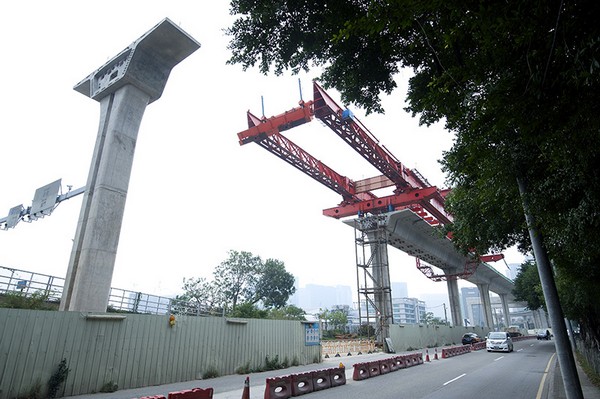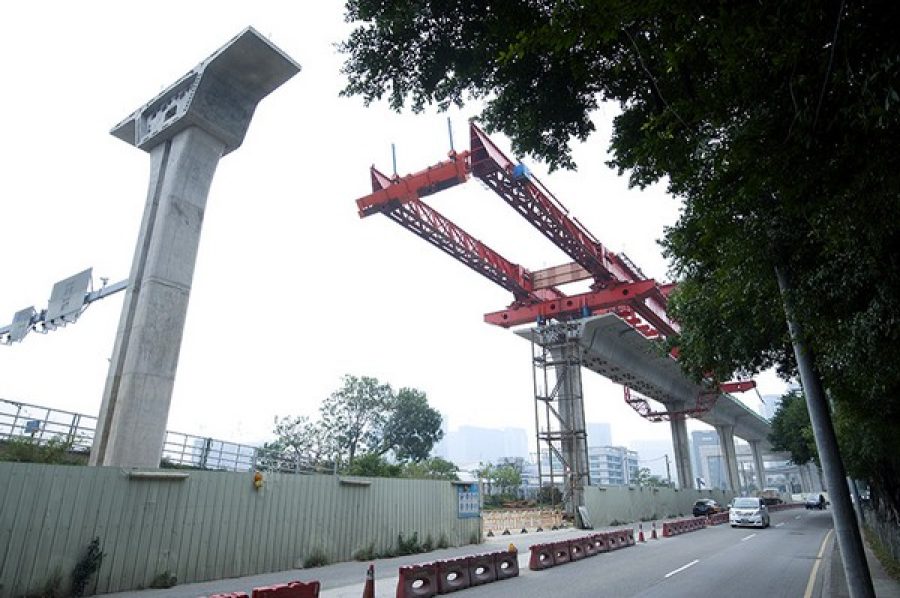The Commission of Audit (CA) slammed the Transportation Infrastructure Office (GIT) Monday for its failure to control the budget for the first phase of the construction of the city’s light transit railway (LRT), which increased from its initial budget in 2007 of 4.2 billion patacas to 14.3 billion patacas in 2012.
The report pointed out that since 2012 the budget has officially not been updated.
The commission said in its third report on the LRT project, released on its website Monday, that the cost of the project could possibly increase by about one billion patacas for every year the system is under construction.
The commission criticised the office for failing to provide an accurate budget and for not providing updated information on the rising costs.
The office had only given the commission the 2012 budget information when the commission drafted the report.
The report found that, according to information provided by the consultancy hired by the office, the first phase of the LRT was scheduled to start operating in September 2017, but this has now been delayed by at least 883 days.
The project is under the direct supervision of the office. The first phase of the LRT project proposed the construction of 21 stations with 12 on the peninsula and 11 in Taipa and Cotai.
While the proposed stations’ locations have been changed several times, the total number of station remains unchanged. The construction of the LRT in Taipa started in 2009.
The commission also criticised the office for its failure to supervise the consortium which it paid 176 million patacas for consultancy services for 46 months starting from March 2009 and ending in January 2013. The report found that during the first 24 months the consultancy failed to allocate enough manpower on the project, showing a shortfall of up to 45 percent in the number of staff.
The commission, which started auditing the LRT project in 2010, also said that the office extended the consultancy’s contract for 35 months at a cost of about 960 million which will expire at the end of this year.
The report did not name the consultancy. According to a notice published in the Official Gazette (BO) in 2013, the consultancy consortium comprises Egis Rail/Fase – Estudos e Projectos S.A./Setec its.
The commission also slammed the office for its handling of the project’s contractors after discovering that there have been severe delays in their respective sections, pointing out that the commission found that the construction of the LRT sections in the centre of Taipa, Cotai and near the airport and Taipa’s temporary ferry terminal were found to be 250 to 336 days behind schedule. The LRT depot project in Cotai was found to be 322 days behind schedule.
According to the report, the contractors failed to employ enough construction workers for their respective projects. Regarding the construction of three LRT stations near the the airport, ferry terminal and Macau University of Science Technology (MUST), the contractor had promised to allocate 655 to 789 construction workers between January and June 2013 but actually only around 168 workers were on site.
The commission also said that the office had ordered four contractors to submit new plans for their respective projects, adding that on realising that the plans failed to adhere to the original schedule, the office repeatedly asked the contractors for a year to improve their plans. The report pointed out that this happened despite the fact that it was within its power to draw up new plans for the constructors to ensure that the projects are finished on time. The commission slammed the office for “procrastinating” when dealing with the delays.
As the fines that the contractors can be fined for construction delays are no deterrent as they amount to only about 1,000 patacas for each day of delay, the commission questioned as to why the office never adopted the methods suggested by the International Federation of Consulting Engineers (FIDIC) when dealing with delays by using the legal concept of “compensation” if the contractors fail to comply with any of the provisions in their respective contracts.
The commission said that according to the latest developments it did not expect the LRT project to be fully completed until 2019 or 2020. (macaunews/macapost)






